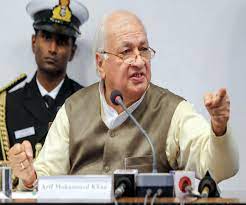Limits of pleasure : On Kerala Governor-government spat
Kerala Governor Arif Mohammed Khan should not conflate his role as Chancellor with his constitutional duties
Kerala Governor Arif Mohammed Khan has declared that he is withdrawing his pleasure as far as Finance Minister K.N. Balagopal is concerned. He expects constitutionally appropriate action by Chief Minister Pinarayi Vijayan. In other words, Mr. Khan wants Mr. Balagopal dismissed for remarks that he sees as seditious, undermining national unity and stoking regionalism. However, Mr. Vijayan has rejected the demand. It is difficult to agree with the Governor’s assessment that an observation that those who had seen only universities in Uttar Pradesh would not understand universities in Kerala is seditious or goes against national unity. In normal circumstances, when the Governor conveys his displeasure with a Minister’s conduct, it will have considerable persuasive value. However, in the backdrop of the unrelenting acrimony between Raj Bhavan and the Cabinet, it may have not evoked any serious response. Needless to say, the polite phrase in the Constitution that applies the doctrine of pleasure to a Minister’s tenure is nothing more than a reference to the Will of the Chief Minister on the continuance or dismissal of a member of his ministerial Council.
This constitutional position, however, does not mean that the underlying controversy over the appointment of Vice-Chancellors to universities in Kerala can be brushed aside. After the Supreme Court set aside the appointment made in the A.P.J. Abdul Kalam Technological University, Thiruvananthapuram, Mr. Khan directed nine other V-Cs to resign, flagging what he felt were similar legal infirmities in their appointment. His point was that just as it was in the case before the apex court, these V-Cs too were either appointed by the submission of a single name by Search Committees (instead of a panel of three to five names, as required under University Grants Commission regulations), or were chosen by committees that included the State’s Chief Secretary. The Governor/Chancellor was obviously wrong in fixing a short deadline for their resignation, and he subsequently converted the communication into show-cause notices to them, asking them to explain why their appointments should not be deemed illegal. It is a separate legal question whether the judgment in the case of one V-C is automatically applicable to all others. However, given its potential for litigation, the sooner the university statutes in Kerala are brought in line with the UGC regulations, the better. However, there is no doubt that Governor-Chancellors should not conflate their statutory powers to handle university matters with their constitutional role in Raj Bhavan. The tussle makes a good case for why Governors, whose overtly political functioning is an uneasy fact of political life, should not be tasked with being Chancellors.
(Source: The Hindu, it is meant for educational purposes only)
